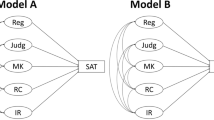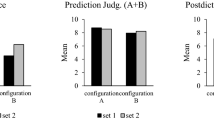Abstract
Various instruments for assessing metacognitive skills and strategy use exist. Off-line self-reports are questionnaires and interviews administered either before or after task performance, while on-line measures are gathered during task performance through thinking aloud or observation. Multi-method studies in reading have shown that off-line methods suffer from serious validity problems, whereas the validity of on-line methods is adequate. Little is known, however, about the validity of methods for assessing metacognition in mathematics. Five instruments were administered to 30 secondary-school students: two prospective questionnaires (MSLQ and ILS) before a mathematics task, two on-line methods (observation and thinking aloud) concurrent to the mathematics task, and a task-specific retrospective questionnaire after the mathematics task. Mathematics performance was assessed by a posttest and GPA. Results confirm that prospective questionnaires have poor convergent and predictive validity in mathematics. Although the retrospective questionnaire does slightly better than prospective questionnaires, the validity of both on-line methods stands out. It is concluded that on-line instruments should be preferred over off-line instruments for the assessment of metacognitive skillfulness in mathematics.
Similar content being viewed by others
References
Aydin, U., & Ubuz, B. (2010). Structural model of metacognition and knowledge of geometry. Learning and Individual Differences, 20, 436–445.
Azevedo, R., & Cromley, J. G. (2004). Does training on self-regulated learning facilitate students’ learning with hypermedia? Journal of Educational Psychology, 96, 523–535.
Azevedo, R., Greene, J. A., & Moos, D. C. (2007). The effect of a human agent’s external regulation upon college students’ hypermedia learning. Metacognition and Learning, 2, 67–87.
Bannert, M., & Mengelkamp, C. (2008). Assessment of metacognitive skills by means of instruction to think aloud and reflect when prompted. Does the verbalization method affect learning? Metacognition and Learning, 3, 39–58.
Brown, A. (1987). Metacognition, executive control, self-regulation, and other more mysterious mechanisms. In F. E. Weinert & R. H. Kluwe (Eds.), Metacognition, motivation and understanding (pp. 65–116). Hillsdale: Erlbaum.
Cromley, J. G., & Azevedo, R. (2006). Self-report of reading comprehension strategies: What are we measuring? Metacognition and Learning, 1, 229–247.
De Groot, A. D. (1969). Methodology, foundations of inference and research in the behavioral sciences. The Hague: Mouton.
Dent, A. L., & Koenka, A. C. (2016). The relation between self-regulated learning and academic achievement across childhood and adolescence: A meta-analysis. Educational Psychology Review, 28, 425–474.
Desoete, A. (2008). Multi-method assessments of metacognitive skills in elementary school children: How you test is what you get. Metacognition and Learning, 3, 189–206.
Desoete, A., & Veenman, M. V. J. (2006). Introduction. In A. Desoete & M. V. J. Veenman (Eds.), Metacognition in mathematics education (pp. 1–10). Hauppauge: Nova Science Publishers.
Dignath, C., & Büttner, G. (2008). Components of fostering self-regulated learning among students. A meta-analysis on intervention studies at primary and secondary school level. Metacognition and Learning, 3, 231–264.
Dinsmore, D. L., Alexander, P. A., & Loughlin, S. M. (2008). Focusing the conceptual lens on metacognition, self-regulation, and self-regulated learning. Educational Psychology Review, 20, 391–409.
Dunlosky, J., & Nelson, T. O. (1992). Importance of the kind of cue for judgments of learning (JOL) and the delayed-JOL effect. Memory & Cognition, 20, 374–380.
Ericsson, K. A., & Simon, H. A. (1993). Protocol analysis. Cambridge: MIT Press.
Flavell, J. H. (1976). Metacognitive aspects of problem solving. In L. B. Resnick (Ed.), The nature of intelligence (pp. 231–235). Hillsdale: Erlbaum.
Flavell, J. H. (1979). Metacognition and cognitive monitoring: A new area of cognitive-developmental inquiry. American Psychologist, 34, 906–911.
Gascoine, L., Higgins, S., & Wall, K. (2017). The assessment of metacognition in children aged 4–16 years: a systematic review. Review of Education, 5, 3–57.
Guilford, J. P. (1965). Fundamental statistics in psychology and education. New York: McGraw-Hill.
Jacobse, A. E., & Harskamp, E. G. (2012). Towards efficient measurement of metacognition in mathematical problem solving. Metacognition and Learning, 7, 133–149.
Kramarski, B., & Mevarech, Z. R. (2003). Enhancing mathematical reasoning in the classroom: The effects of cooperative learning and metacognitive training. American Educational Research Journal, 40, 281–310.
Li, J., Zhang, B., Du, H., Zhu, Z., & Li, Y. M. (2015). Metacognitive planning: Development and validation of an online measure. Psychological Assessment, 27, 260–271.
Meijer, J., Veenman, M. V. J., & van Hout-Wolters, B. H. A. M. (2006). Metacognitive activities in text-studying and problem-solving: Development of a taxonomy. Educational Research and Evaluation, 12, 209–237.
Mevarech, Z., & Fridkin, S. (2006). The effects of IMPROVE on mathematical knowledge, mathematical reasoning and meta-cognition. Metacognition and Learning, 1, 85–97.
Muis, K. R., Winne, P. H., & Jamieson-Noel, D. (2007). Using a multitrait-multimethod analysis to examine conceptual similarities of three self-regulated learning inventories. British Journal of Educational Psychology, 77, 177–195.
Nunnally, J. C., & Bernstein, I. H. (1994). Psychometric theory (3rd edn.). New York: McGraw-Hill.
Pape, S. J., & Wang, C. (2003). Middle school children’s strategic behavior: Classification and relation to academic achievement and mathematical problem solving. Instructional Science, 31, 419–449.
Pintrich, P. R., & De Groot, E. V. (1990). Motivational and self-regulated leaning components of classroom academic performance. Journal of Educational Psychology, 82, 33–40.
Pressley, M., & Gaskins, I. (2006). Metacognitive competent reading is constructively responsive reading: How can such reading be developed in students? Metacognition and Learning, 1, 99–113.
Schellings, G. (2011). Applying learning strategy questionnaires: Problems and possibilities. Metacognition and Learning, 6, 91–109.
Schraw, G., & Dennison, R. S. (1994). Assessing metacognitive awareness. Contemporary Educational Psychology, 19, 460–475.
Schraw, G., & Moshman, D. (1995). Metacognitive theories. Educational Psychology Review, 7, 351–371.
Sperling, R. A., Ramsay, C. M., Richmond, A. S., & Klapp, M. (2012). The measurement and predictive ability of metacognition in middle school learners. Journal of Educational Research, 105, 1–7.
Van der Stel, M., & Veenman, M. V. J. (2014). Metacognitive skills and intellectual ability of young adolescents: A longitudinal study from a developmental perspective. European Journal of Psychology of Education, 29, 117–137.
Van der Stel, M., Veenman, M. V. J., Deelen, K., & Haenen, J. (2010). Development of metacognitive skills in mathematics. ZDM International Journal on Mathematics Education, 42, 219–229.
Veenman, M. V. J. (2005). The assessment of metacognitive skills: What can be learned from multi-method designs? In C. Artelt & B. Moschner (Eds.), Lernstrategien und Metakognition: Implikationen für Forschung und Praxis (pp. 75–97). Berlin: Waxmann.
Veenman, M. V. J. (2006). The role of intellectual and metacognitive skills in math problem solving. In A. Desoete & M. V. J. Veenman (Eds.), Metacognition in mathematics education (pp. 35–50). Hauppauge: Nova Science Publishers.
Veenman, M. V. J. (2007). The assessment and instruction of self-regulation in computer-based environments: A discussion. Metacognition and Learning, 2, 177–183.
Veenman, M. V. J. (2008). Giftedness: Predicting the speed of expertise acquisition by intellectual ability and metacognitive skillfulness of novices. In M. F. Shaughnessy, M. V. J. Veenman & C. Kleyn-Kennedy (Eds.), Meta-cognition: A recent review of research, theory, and perspectives (pp. 207–220). Hauppage: Nova Science Publishers.
Veenman, M. V. J. (2011). Alternative assessment of strategy use with self-report instruments: A discussion. Metacognition and Learning, 6, 205–211.
Veenman, M. V. J. (2013). Training metacognitive skills in students with availability and production deficiencies. In H. Bembenutty, T. Cleary & A. Kitsantas (Eds.), Applications of self-regulated learning across diverse disciplines: A tribute to Barry J. Zimmerman (pp. 299–324). Charlotte: Information Age Publishing.
Veenman, M. V. J. (2013). Assessing metacognitive skills in computerized learning environments. In R. Azevedo & V. Aleven (Eds.), International handbook of metacognition and learning technologies (pp. 157–168). New York: Springer.
Veenman, M. V. J. (2015). Metacognition: ‘Know thyself’. Use that knowledge especially to regulate your own behavior. De Psycholoog, 50, 8–18 (special ed.).
Veenman, M. V. J. (2017). Learning to self-monitor and self-regulate. In R. Mayer & P. Alexander (Eds.), Handbook of research on learning and instruction (2nd ed., pp. 233–257). New York: Routledge.
Veenman, M. V. J., Bavelaar, L., De Wolf, L., & Van Haaren, M. G. P. (2014). The on-line assessment of metacognitive skills in a computerized environment. Learning and Individual Differences, 29, 123–130.
Veenman, M. V. J., Elshout, J. J., & Busato, V. V. (1994). Metacognitive mediation in learning with computer-based simulations. Computers in Human Behavior, 10, 93–106.
Veenman, M. V. J., Elshout, J. J., & Groen, M. G. M. (1993). Thinking aloud: Does it affect regulatory processes in learning. Tijdschrift voor Onderwijsresearch, 18, 322–330.
Veenman, M. V. J., Kerseboom, L., & Imthorn, C. (2000). Test anxiety and metacognitive skillfulness: Availability versus production deficiencies. Anxiety, Stress, and Coping, 13, 391–412.
Veenman, M. V. J., Kok, R., & Blöte, A. W. (2005). The relation between intellectual and metacognitive skills at the onset of metacognitive skill development. Instructional Science, 33, 193–211.
Veenman, M. V. J., Prins, F. J., & Verheij, J. (2003). Learning styles: Self-reports versus thinking-aloud measures. British Journal of Educational Psychology, 73, 357–372.
Veenman, M. V. J., Van Hout-Wolters, B. H. A. M., & Afflerbach, P. (2006). Metacognition and learning: Conceptual and methodological considerations. Metacognition and Learning, 1, 3–14.
Veenman, M. V. J., Wilhelm, P., & Beishuizen, J. J. (2004). The relation between intellectual and metacognitive skills from a developmental perspective. Learning and Instruction, 14, 89–109.
Vermunt, J. D. H. M. (1998). The regulation of constructive learning processes. British Journal of Educational Psychology, 68, 149–172.
Vuijk, R. A. J., Reichard, L. A., Rozemond, S., Dijkhuis, J. H., Admiraal, C. J., Aalmoes, H., et al. (2003). Getal en Ruimte [Number and Space]. Houten: EPN.
Wang, M. C., Haertel, G. D., & Walberg, H. J. (1990). What influences learning? A content analysis of review literature. Journal of Educational Research, 84, 30–43.
Winne, P. H. (1996). A metacognitive view of individual differences in self-regulated learning. Learning and Individual Differences, 8, 327–353.
Winne, P. H. (2014). Issues in researching self-regulated learning as patterns of events. Metacognition and Learning, 9, 229–237.
Winne, P. H., & Jamieson-Noel, D. (2002). Exploring students’ calibrations of self reports about study tactics and achievement. Contemporary Educational Psychology, 27, 551–572.
Zimmerman, B. J., & Martinez-Pons, M. (1990). Student differences in self-regulated learning: Relating grade, sex, and giftedness to self-efficacy and strategy use. Journal of Educational Psychology, 82, 51–59.
Author information
Authors and Affiliations
Corresponding author
Rights and permissions
About this article
Cite this article
Veenman, M.V.J., van Cleef, D. Measuring metacognitive skills for mathematics: students’ self-reports versus on-line assessment methods. ZDM Mathematics Education 51, 691–701 (2019). https://doi.org/10.1007/s11858-018-1006-5
Accepted:
Published:
Issue Date:
DOI: https://doi.org/10.1007/s11858-018-1006-5




